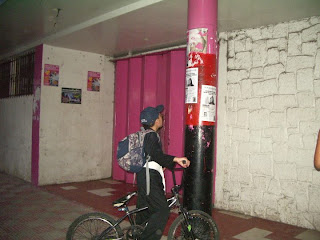22 August 2012. One of our major goals during these early months of
our stay in Nicaragua is to learn about the culture of the Nicaraguan people. The issues people face, and how they have
learned to deal with them.
Sarah (who is Peggy’s niece) works for another non-government
organization (NGO) promoting health education in Nicaragua. She came to visit us last weekend, and told
us this story from the village where she lives.
Feeling offended and belittled by the demeaning
catcalls men often shout at ordinary women walking on city sidewalks, a local
women’s group in the village of San Ramon decided on a plan to make their
feelings known—very well known. Ten or
12 of the women went to the nearby city of Matagalpa equipped with nothing but
a whistle and a red card for each. With
the whistles and cards in hand, the women began to walk through the streets of
the city.
When they heard a catcall (and there were many), the
group would figure out which man was responsible and approach him directly. When they got near to him, all the women held
up the red cards and blew their whistles, long and loud.
They didn’t need to say a word, yet they got their
message across in a language the men completely understood.
“TWEEET! A RED
CARD! TWEEEEEEEET! Ten more RED CARDS! TWEEET! TWEET! A dozen more TWEETS!
And the men understood. “You have committed a foul! You’re out of the game! Don’t do that again! Not ever again!”
Some men turned their faces away. Many turned red with embarrassment. Their friends disappeared, abandoning them to
suffer alone in their shame.
But that wasn’t all.
The women took photographs. Then
they spoke to the newspaper. A news story
was published, complete with pictures.
And then the women posted the printed story on boards and light poles
all over the city. There the story was
read by many, young and old.
 Wasn’t that an innovative idea? It so effectively called public attention to
a degrading problem, but no harsh words needed to be said. The women got to let off some steam—almost literally—but
without harming anything. Nothing, that
is, except the offending male egos. They
used a humorous means to let their feelings be known publicly while clearly
communicating their displeasure to the very people who caused their pain. Surely it was a remarkable local response to
a common problem for women. I admire their courage and creativity.
Wasn’t that an innovative idea? It so effectively called public attention to
a degrading problem, but no harsh words needed to be said. The women got to let off some steam—almost literally—but
without harming anything. Nothing, that
is, except the offending male egos. They
used a humorous means to let their feelings be known publicly while clearly
communicating their displeasure to the very people who caused their pain. Surely it was a remarkable local response to
a common problem for women. I admire their courage and creativity.
